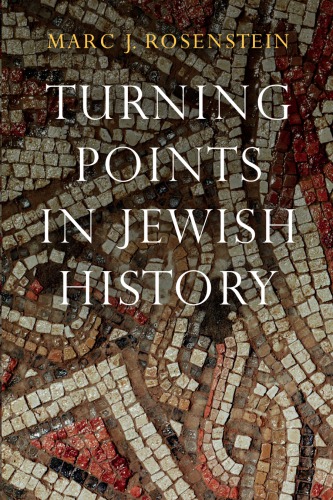
Turning Points in Jewish History
کتاب های مرتبط
- اطلاعات
- نقد و بررسی
- دیدگاه کاربران
نقد و بررسی

May 28, 2018
Rosenstein (Our Place in the Universe) comprehensively covers Jewish history in a book that’s most likely to be used as a college textbook, though it has some appeal to lay readers. Each chapter contains a “text for discussion” (such as Abraham Joshua Heschel’s discussion of the revelation at Sinai) and the introduction provides a suggestion for the order of assignments to students. With strong overviews of foundational developments throughout Judaism—the exodus from Egypt, the destruction of the first and second temples, the expulsion of Iberian Jewry, the Holocaust, and the founding of the modern state of Israel—readers will appreciate Rosenstein’s evenhanded treatment. Throughout, he adds commentary on primary texts, but his suggestions for further reading are often dated and overly narrow. For example, even with the volume of recent scholarship, all of his four recommended readings about the Holocaust are more than 15 years old and most are more than 40 years old. Despite the lack of suitable references, this book serves as a solid, if sometimes superficial, introductory survey.

Starred review from May 15, 2018
A rock-solid primer on the history and background of the Jewish people that will appeal to adherents and non-Jews alike.Surveying more than three millennia--from the Call to Abraham in roughly 1500 B.C.E. to the fall of the Iron Curtain in 1989--Rosenstein (Director Emeritus, Israel Rabbinical Program/Hebrew Union Coll.; Galilee Diary: Reflections on Daily Life in Israel, 2010, etc.) highlights 30 events that have shaped Jewish life. The author effectively captures the essence of each turning point, providing both a timeline and a salient primary text explaining the Jewish understanding of each event. Abraham's discovering God and Moses' revelation of the law at Sinai embody the spiritual foundation on which Judaism is built. From there, the author travels through the history of Western civilization, including the Babylonian exile, Greek and then Roman rule, the transformation of oral law into the Mishna, and the experiences of Sephardic, Ashkenazi, and Hasidic Jews. The golden age in Spain (roughly 900 to 1200) saw a toleration of non-Muslims, and the diaspora of the 15th century dispersed Spanish Jews, creating new footholds across Europe. The Enlightenment encouraged Reform Jews to modify their beliefs and practices to better integrate. The end of the 18th century saw the partition of Poland and Jews fleeing to Russia, where they were dealt with by blood libel, expulsions, and pogroms. Ultimately, the only way to survive was to flee, and many went to the United States, joined by Germans, Italians, and Irish. The German immigrants brought the Reform movement and created a truly American Judaism. Into modern times, the Zionists, seeing a nationality, disputed the Reformists. From the beginning, Rosenstein insists that Judaism is a combination of nation, culture, and religion, a fact that will be debated for some time to come. Fortunately, he provides us with the fascinating basics to understand that debate.Those who fear deep philosophical meanderings can rest easy. Each chapter is supremely readable, understandable, and enlightening, making the book a valuable addition to any library.
COPYRIGHT(2018) Kirkus Reviews, ALL RIGHTS RESERVED.

























دیدگاه کاربران